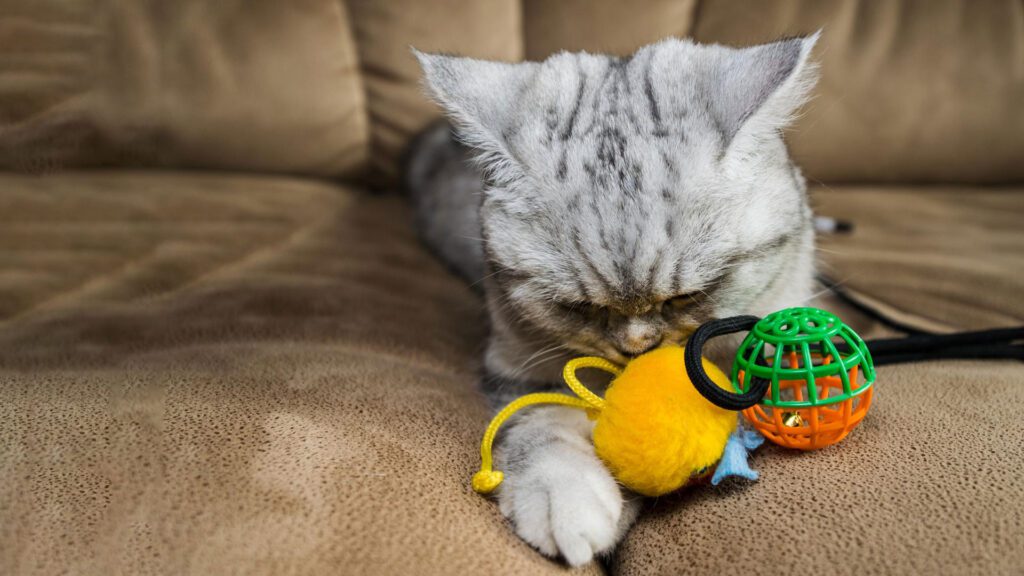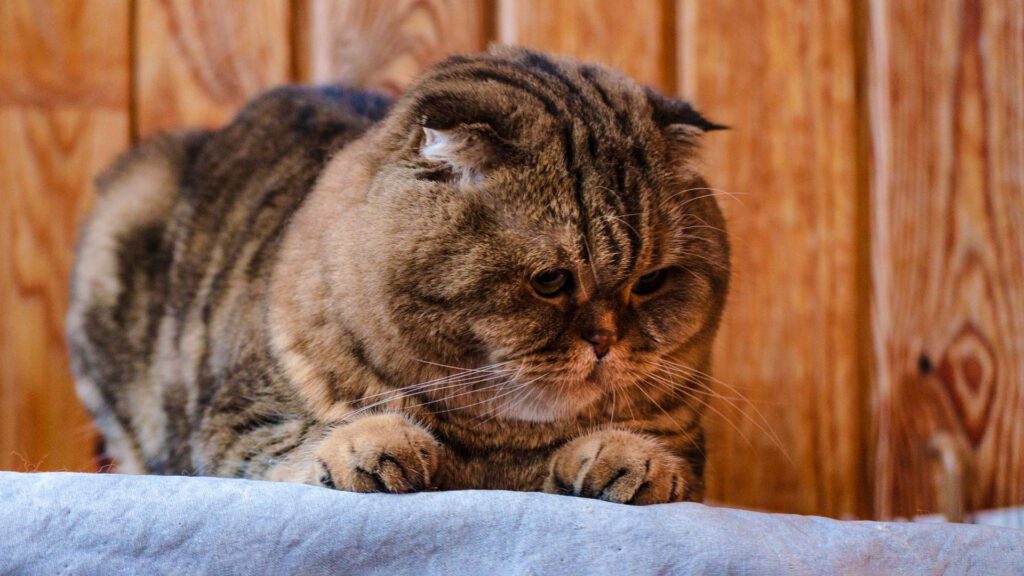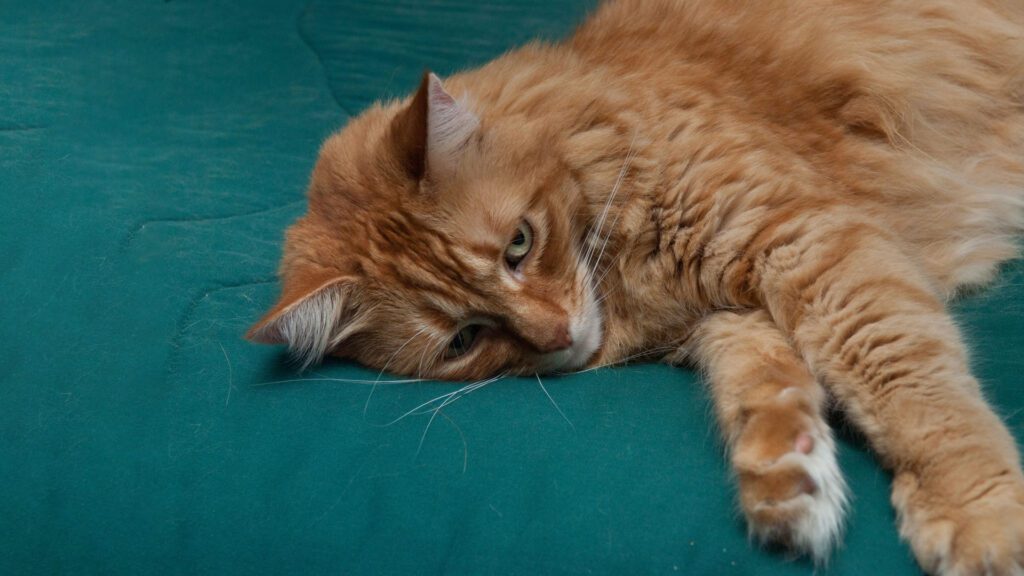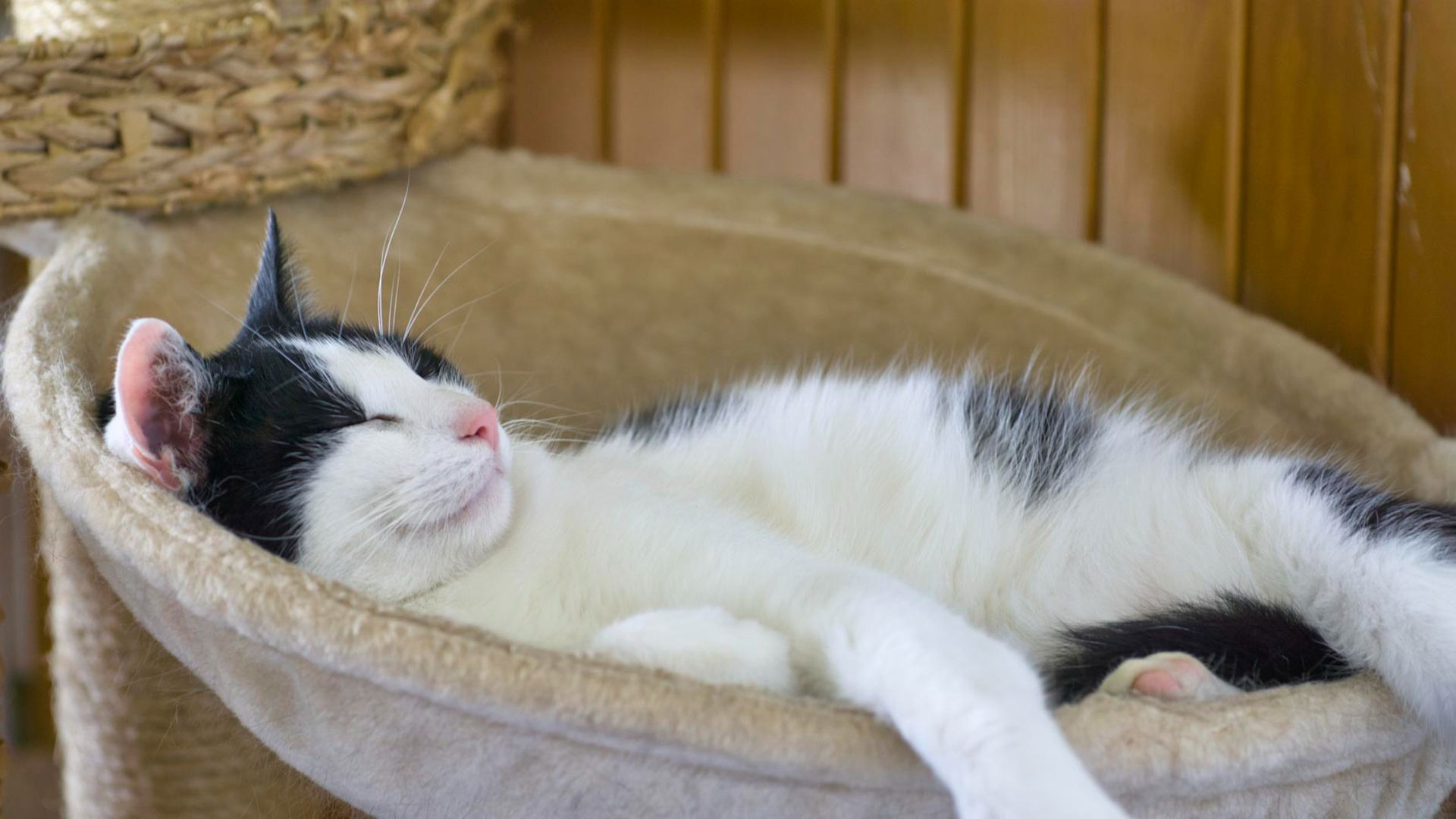“Why is my cat so lazy?“
This is a question many cat owners ask themselves when they see their cat lying around the house.
Luckily, you’ve come to the right place for answers! Read on to learn all about laziness in cats!
Cats: The Sleepy Champions

Cats love to sleep. In fact, they can spend up to 18 hours a day just snoozing! Here’s why your cat needs so much sleep:
Natural Instinct
Cats are crepuscular, which means they’re most active during the dawn and dusk. The rest of the time, they conserve energy by resting.
Their wild ancestors had to hunt for food, which required short bursts of intense energy followed by long periods of rest. Even though your house cat isn’t hunting in the wild, they still have that instinct.
Diet
Cats are carnivores, and eating meat requires a lot of energy to digest. So, after your cat enjoys a meal, it might need to recharge with a good nap.
Age
Adult cats typically require about 12 to 18 hours of sleep per day, while senior felines – those over the age of seven – may sleep upward of 20 hours. This increased need for rest helps them conserve energy and supports their overall health.
It’s All in the Breed
The type of cat you have can affect how active they are. When you pick a cat, it’s good to think about what kind of personality fits with your life.
For instance, if you have a busy lifestyle and can’t play with your cat often, a Ragdoll might be a good match. They’re known for their laid-back attitudes and enjoy cuddling on your lap.
On the other hand, if you’re someone who loves interactive play and has time to dedicate to your pet, a Bengal cat could be the perfect companion with their playful and adventurous spirit.
The Genetic Factor
Cats like the Siamese or Abyssinian are naturally curious and have high energy levels. They need more stimulation through play and exploration to stay happy.
Meanwhile, breeds such as the Persian or British Shorthair are more content with a calm environment. They don’t require as much active playtime.
Individual Factors
It’s also important to consider that an individual cat’s activity level can vary, even within the same breed. Plus, factors like age, health, and environment play a role too.
Kittens and young cats tend to have more energy, while older cats might prefer a more relaxed lifestyle.
A Spoiled Kitty

Cats can get a little spoiled. But sometimes, giving them everything they want might lead to a less active lifestyle. They don’t need to do anything and hence become bored and inactive.
Playtime is super important for their body and mind. It provides both physical and mental stimulation. Plus, it’s a great way for cat owners to strengthen their bond share with your furry friend.
Variety Of Toys
To keep things lively and engaging, try playing with your cat more and switching up their toys. A variety of toys not only keeps your cat interested but also challenges them to think and move in new ways.
Cat toys that mimic the movements of mice or birds can tap into their natural hunting instincts. These can include feather wands, laser pointers, or even remote-controlled mice. Puzzle feeders are also fantastic for making mealtime a brain game.
Is Your Cat Too Chubby?

Gaining excess weight can make it tough for cats to move around the household, which might cause them to become even less active. If you observe your cat being sluggish or struggling to jump and run, it could be a sign they are overweight.
Carrying extra pounds can lead to health issues for your feline friend. Overweight cats are at risk for diabetes, joint problems, and even breathing difficulties. That’s why keeping an eye on your cat’s physique is important.
You can check by feeling around their ribs and spine. You should be able to feel these bones, but they shouldn’t stick out too much. If you can’t find them under a layer of fat, it’s time for action.
Health Concerns and Lethargy

While cats are known for enjoying their nap time, a sudden increase in laziness might be a signal that something’s not quite right with their health.
Cats are masters at hiding discomfort or illness, so it’s up to pet parents to spot the subtle changes in their behavior.
A decrease in appetite: It’s normal for a cat’s eating habits to vary slightly, but if you find that your cat is consistently leaving food untouched, it’s worth paying attention to.
Changes in litter box habits: Using the litterbox more or less often can also be a clue. These shifts might indicate anything from stress to a possible health issue.
Other signs could include a lack of interest in playtime, a drop in energy levels, or even hiding more than usual.
Certain medications can impact a cat’s energy levels and lead to lethargy.
If these behaviors are accompanied by other symptoms like vomiting, diarrhea, or changes in drinking water, it’s especially important to seek veterinary advice.
Environment and Boredom

Just like people, cats need entertainment and adventure in their lives to stay happy and healthy. They’re naturally curious creatures who love to explore and play.
When cats get bored, they may not be as active as they usually are. Boredom in cats can lead to sadness or even bad behavior as they try to find ways to entertain themselves.
New Environment
A change in their environment can also affect their mood. For example, moving to a new home can make cats feel quite stressed. They have to deal with new sights, smells, and sounds, all of which can be overwhelming.
New People
Similarly, having new people around can be a big change for them. Cats are creatures of habit, so they might need some time to adjust to new family members or visitors.
Providing a Stimulating Environment
It’s important to create a stimulating environment for your cat. This means having plenty of toys around, maybe a cat tree to climb, a scratching post they can claw at, or even just a cardboard box they can play in.
Try to mix things up regularly so they always have something new to investigate.
Keeping an Eye on Activity Level
While it’s okay for cats to have downtime, it’s also important to make sure they get some activity. A healthy cat will have moments of playfulness and curiosity.
Encourage this by providing toys, climbing trees, or interactive play sessions. This helps them stay fit and prevents boredom. A happy cat is one that balances relaxation with activity.
When to Consult a Vet

If your cat’s lazy days are becoming more frequent and they’re showing less interest in activities they usually enjoy, it might be time to check in with a veterinarian.
Changes in behavior, especially if they’re sudden, can be a sign of underlying problems. Regular check-ups can help ensure your cat stays in tip-top shape.
Understanding Your Pet Cat’s Lethargic Behavior
Cats need a certain amount of rest and relaxation for their physical and mental well-being. When you know why your cat might be feeling lazy, you can help them have the best life.
Whether they need more playtime, a check-up at the vet, or just a cozy spot to nap, you can make sure your cat is happy and loved.





